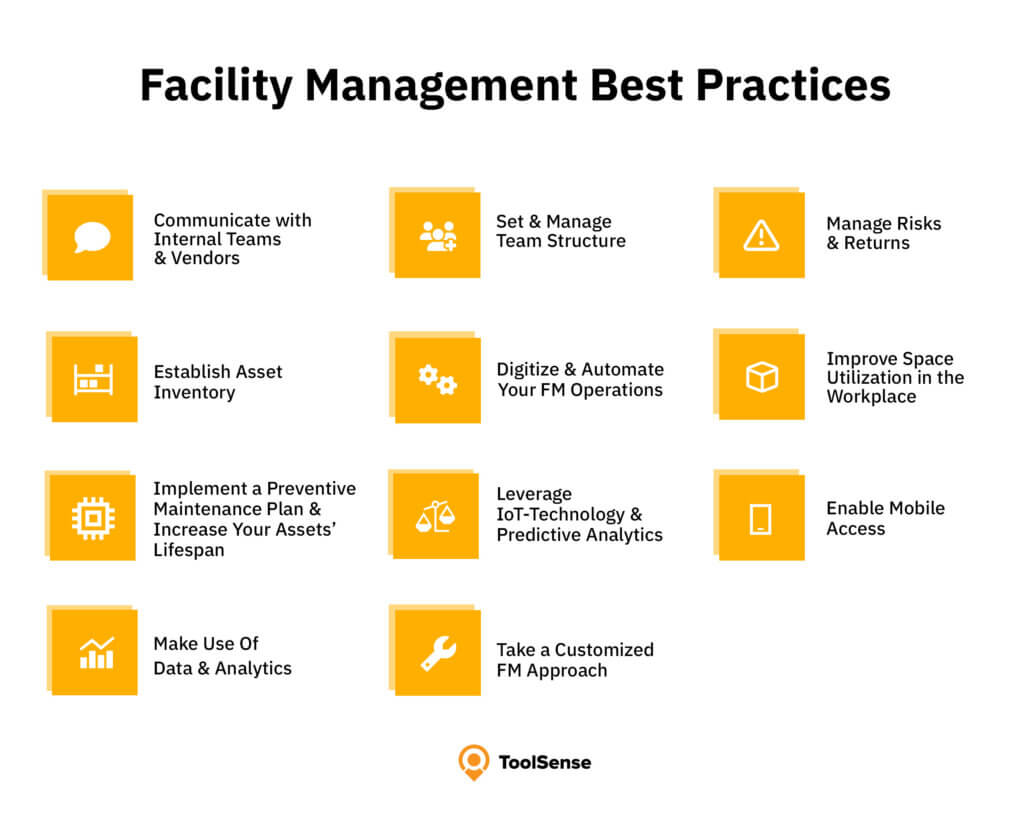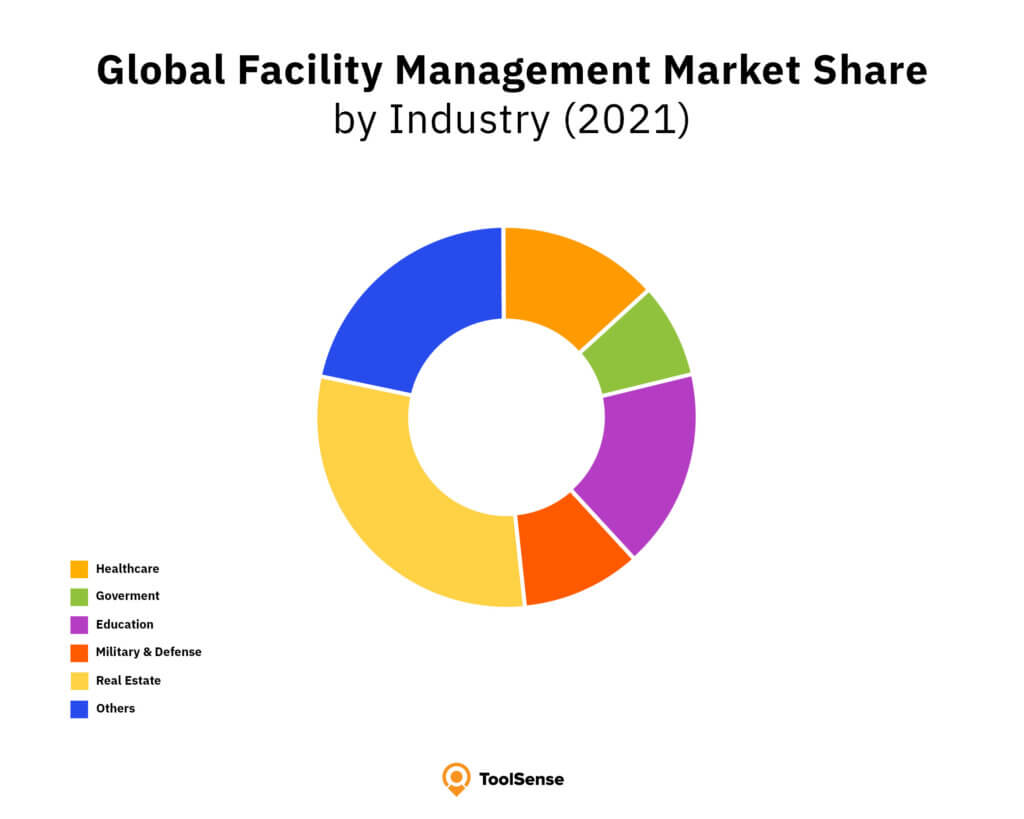Best Practices in Facility Management for Modern Companies
Best Practices in Facility Management for Modern Companies
Blog Article
Trick Patterns Forming the Future of Facility Management in 2024
As we expect 2024, the landscape of facility monitoring is poised for significant change, driven by numerous vital trends. The combination of wise structure technologies and a shift towards data-driven decision-making pledge to boost operational efficiency while prioritizing sustainability in method. In addition, the emergence of hybrid work designs is improving workplace settings, demanding cutting-edge layout solutions that satisfy advancing staff member demands. In the middle of these adjustments, the concentrate on owner health remains to get grip, highlighting the value of a healthy and balanced work environment. Exactly how these patterns will manifest in practice remains an important concern for market professionals.
Smart Building Technologies

Smart structure modern technologies incorporate a wide variety of systems, consisting of intelligent lighting, heating and cooling controls, and security systems. By incorporating these systems, center managers can check and readjust criteria in real-time, leading to significant reductions in power waste and functional prices. Wise sensing units can detect tenancy degrees and change lighting and temperature level appropriately, making certain that power is just made use of when needed.
Additionally, these innovations help with improved information collection, allowing companies to track usage patterns and identify opportunities for more renovations. The application of clever building innovations not just contributes to sustainability goals however likewise produces much healthier work settings that can increase employee efficiency and complete satisfaction.
As we relocate right into 2024, the fostering of wise building modern technologies will likely increase, reflecting a wider change towards more smart, receptive, and lasting facility administration practices.
Data-Driven Choice Making
Increasingly, organizations are leveraging data-driven decision making to improve center management techniques. By taking advantage of data analytics, center supervisors can obtain actionable insights that substantially boost functional performance and resource allocation. The integration of sophisticated innovations, such as IoT sensors and real-time tracking systems, enables the collection of huge amounts of information on building efficiency, occupancy prices, and energy usage.
This wide range of details allows facility managers to identify patterns, forecast upkeep needs, and proactively address problems prior to they rise. Predictive analytics can forecast devices failings, decreasing downtime and repair work expenses. Additionally, data visualization devices help with far better interaction among stakeholders, making certain that notified decisions are made collaboratively.
Additionally, data-driven approaches boost strategic planning by making it possible for center supervisors to evaluate the efficiency of present practices and make educated choices regarding financial investments in modern technology or framework. As companies progressively prioritize functional excellence, data-driven choice making is poised to come to be a keystone of successful facility management methods in 2024 and beyond. Eventually, the capability to utilize information effectively will equip companies to develop a lot more efficient, productive, and resistant centers.
Sustainability and Eco-friendly Practices
The focus on data-driven decision making naturally lines up with the growing focus on click here to find out more sustainability and green practices within center monitoring. As organizations significantly prioritize environmental responsibility, facility supervisors are leveraging analytics to maximize source usage, decrease waste, and decrease carbon footprints. This critical method enables the integration of energy-efficient systems, such as LED lights, smart HVAC controls, and sustainable energy sources into facility procedures.
Furthermore, the application of lasting techniques expands past energy usage. Center managers are taking on eco-friendly materials and promoting reusing initiatives to produce a circular economy within their centers. This not only enhances the ecological profile of the company however additionally promotes a culture of sustainability amongst staff members.
Conformity with ecological laws is one more essential aspect driving the adoption of environment-friendly techniques. By utilizing data analytics, center managers can monitor compliance metrics and identify locations for improvement, making certain adherence to regional and international sustainability requirements.
Crossbreed Job Models
A substantial shift towards hybrid job models is reshaping the landscape of center administration in 2024. This paradigm integrates in-office and remote work, requiring a reevaluation of room utilization, resource allowance, and staff member engagement approaches. Organizations are significantly recognizing the significance of flexible work spaces that satisfy diverse demands and preferences.
Center managers should adjust by implementing versatile workplace layouts that sustain collective efforts while supplying areas for concentrated work. This includes the integration of modern technology to assist in smooth communication and partnership among in-office and remote staff members. Smart structure options, geared up with sensing units and analytics, enable real-time monitoring of space use, allowing organizations to enhance their environments effectively.
Furthermore, hybrid work versions highlight the need for effective facility monitoring that focuses on staff member experience. In significance, the hybrid job design is revolutionizing facility management, encouraging a proactive method to meet the evolving needs of the labor force.
Enhanced Passenger Health
As organizations accept hybrid job versions, an increased concentrate on resident wellness is ending up being essential to center administration techniques. Facility Management. This shift acknowledges that a pleased and healthy and balanced workforce straight influences productivity and retention rates. Center supervisors are now focusing on environments that promote physical and psychological health, incorporating aspects such as all-natural lighting, biophilic style, and available wellness resources

Modern technology plays a critical duty in this evolution. Smart building systems can monitor environmental aspects and readjust setups i was reading this in real-time, guaranteeing ideal comfort levels - Facility Management. Additionally, comments devices, such as tenancy sensing units and worker surveys, permit center supervisors to consistently refine wellness efforts based upon passenger demands.

Verdict
In 2024, the future of center management will certainly be significantly influenced by the combination of clever building technologies and data-driven decision-making, promoting enhanced operational performance. Sustainability efforts will focus on environment-friendly methods, while the appearance of crossbreed job versions will certainly require adaptable office designs. Furthermore, an increased concentrate on passenger health via sophisticated cooling and heating systems and biophilic design will add to much healthier work atmospheres. These trends collectively highlight the developing landscape of center administration in feedback to contemporary challenges and possibilities.
Facility managers are promoting and adopting green materials recycling initiatives to create a circular economic climate within their facilities.A considerable shift in the direction of crossbreed work models site link is improving the landscape of center administration in 2024.Moreover, crossbreed work models emphasize the requirement for effective facility management that focuses on worker experience.As companies welcome hybrid work versions, a heightened emphasis on resident health is coming to be essential to center management approaches.In 2024, the future of center monitoring will be significantly affected by the combination of smart structure modern technologies and data-driven decision-making, promoting enhanced functional performance.
Report this page